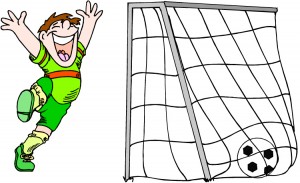Baby Steps Can Lead You Down the Road of Success.
 Set smaller goals and get bigger results? This might seem counterintuitive to you. And if it does, you are not alone. We’re all used to hearing about stretch goals, and when you feel empowered, stretch goals are inspiring and motivating. But when you feel overwhelmed, stretch goals can create paralysis and result in procrastination. When you set your goals too high, you might find it overwhelming and too time consuming. You just give up or keep on changing your goals instead of slowly and steadily working through the baby steps to a bigger goal.
Set smaller goals and get bigger results? This might seem counterintuitive to you. And if it does, you are not alone. We’re all used to hearing about stretch goals, and when you feel empowered, stretch goals are inspiring and motivating. But when you feel overwhelmed, stretch goals can create paralysis and result in procrastination. When you set your goals too high, you might find it overwhelming and too time consuming. You just give up or keep on changing your goals instead of slowly and steadily working through the baby steps to a bigger goal.
Setting small goals makes sense from a more-likely-to-succeed perspective. Baby steps help us manage the fear that keeps us from doing the tasks we dislike or that seem too hard. You feel more confident pursuing smaller goals because you know you are going to achieve them. So you do and this soon puts bigger goals within reach. Setting and reaching small goals sets up a positive snowball effect. Small goals will give you small successes and that will motivate you to continue.
Keep in mind that goal setting isn’t all about success – there will be setbacks. You need to anticipate failure (like gaining a pound after you’ve lost two), so you don’t end up getting derailed and quitting. This is why small goals are preferable because you can measure achievement and the setbacks don’t knock you down so harshly.
When you give up early, it’s likely your goals were too big in the first place. Most people never reach their biggest goals because they can’t stick to them in the beginning. The first 30 to 60 days are key to long term success. That is when you are more likely to put in the hard work to get to a new or different result. You need to put in twice the work in the beginning because you are starting a new habit and breaking an old one at the same time.
The key is to start small with baby steps, achieve some early wins and build your confidence to keep moving forward. When you set small goals, three powerful things happen:
- You achieve the small goals on your list pretty quickly.
- You see yourself making regular progress and this is reinforcing.
- You gain the courage to pursue bigger goals and you keep on working.
Reaching a big goal involves conquering a series of smaller goals. If you’ve tried to reach big goals in the past and failed, don’t give up. Try re-starting this year with smaller goals using the following steps:
 Dream big, execute small. Figure out what it is you want to accomplish. Pick something that is really important to you. Identify why you want to accomplish this goal and what benefits it will have for you. This might be a big long-term goal, but it can help get you started with setting your short-term, smaller goals.
Dream big, execute small. Figure out what it is you want to accomplish. Pick something that is really important to you. Identify why you want to accomplish this goal and what benefits it will have for you. This might be a big long-term goal, but it can help get you started with setting your short-term, smaller goals.- Break up your major goal into smaller, more manageable parts. You are more likely to make your dream come true this way. If your big goal is to walk/jog a half-marathon in September, break it down into baby steps. The small steps could be walk around the block three times this week, hike half a mile walk with my partner, jog one block, etc. Before you know it, you’ll be jogging around the high school track and feeling really good about yourself.
- Stay focused on the present. If your brain starts thinking about the big goal that is 6 months or a year into the future, you will start feeling overwhelmed and fearful or you may have negative thoughts that make you feel like giving up. Instead, use mindfulness to bring your brain back to the small goal that you can realistically achieve in the short-term. Remember, even the highest achievers started with small steps.
- Be positive. Say “I will” rather than “I won’t.” Negative goals make you feel deprived instead of making you feel good about your successes. Instead of saying, “I won’t eat chocolate,” tell yourself, “I will eat vegetables with dinner.”
- Make goals short term and specific. Most small goals can have a set deadline or at least a general timeframe. Specify exactly what you plan to do by tomorrow or next week. Say “I’m going to walk 15 minutes after dinner two evenings this week,” rather than “I’m going to exercise.”
- Measure and track. Use a calendar to track your progress in a visible way. Write down and check off every time you complete a small goal. At the end of the month, you will be surprised and proud at how much you got done.
- Be realistic. Set a realistic amount of small goals. Even small goals take time and effort. In order to achieve long-term success, you have to find small goals you can live with and incorporate into your daily schedule.
- Celebrate and reward yourself. Recognize each small victory. They are your building blocks for long-term success. Sometimes people don’t feel worthy of celebrating a small achievement. You might say, “That was no big deal,” or “It was too easy.” However, you are more likely to stay motivated if you think positive and recognize small successes.
Good luck reaching your goals this year. Make 2013 the year of small goals with big results.
